In the first major case of blockchain technology in India, the CBSE has decided to use it to keep the class 10th and 12th results safe and tamper-proof. For the uninitiated, Blockchain is a method of data storage that is being used increasingly to develop cryptocurrency, shared digital goods like exam results, and so on.
A blockchain collects information together in groups, also known as blocks that hold sets of information. Blocks have certain storage capacities and, when filled, are chained onto the previously filled block, forming a chain of data known as the “blockchain.”
Speaking to news agency ANI, CBSE Director of Information and Technology Antriksh Johri said on September 26: “Blockchain implementation has been done by CBSE. Earlier we introduced Artificial intelligence (AI) and Machine learning (ML) for affiliation systems. Here, the data is linked and stored with cryptographic security so that it is immutable and traceable.”
Johri added: “This will serve as a single source of truthful data for verification for students going for higher education or employment.”
In the last few years, countries like China and South Korea have made a great leap in cutting-edge technologies like blockchain and artificial intelligence. The Chinese government is so advanced in terms of the adoption of new technologies that it started the development of digital currency using blockchain technology almost 5 years ago in 2014 when it was in an early stage of development even among the private players.
India is sort of catching up because so far there was public infrastructure, scepticism on the part of the government in the adoption of these technologies, and lack of regulatory framework. However, after the covid-19 pandemic, the government decided to shed all reluctance of new technologies, and ministries were told by the PMO to come forward with use cases of cutting-edge technologies.
In 2018, RBI had released a notification about banning cryptocurrency in the country. The NITI Aayog showed a less sceptical attitude about cryptocurrency and the technology it uses- Blockchain.
The government will build a blockchain called Indiachain, which is similar to Indiastack’s unified payments interface, a layer of software that makes it easy to transfer money in real-time. The UPI is a platform developed by the National Payments Corporation of India, a government entity that allows private players like Paytm, Google’s Tez, Phonepe to use its software.
The Indiachain was conceptualized on similar lines with the aim to allow both government and private entities to take advantage and build large-scale solutions. A NITI Aayog official said IndiaChain is being looked at from the same lens to build an interoperable platform that others can also use, some reference blockchain applications will be built and then other companies can build similar or better applications. As of now, the following countries use Blockchain technology for various purposes.
The Indiachain could be used for land Records, supply chain Management, Identity management, benefit distribution, educational certificates, power distribution, cross-border finance, etc. India has long faced a problem with the availability of data that could be used for efficient delivery of public goods, keeping records of income of the people, the property they own, etc.
The blockchain will also be used for healthcare benefits like vaccines and immunization and for this IndiaChain or its side chains will need to be built in such a way that hospitals and doctors see value in it and adapt it easily. Recently the Ministry of Electronics and IT released a plan to take the productivity of the technology sector to 1 trillion dollars in order to achieve the 5 trillion dollars economy goal.
As a part of the 1,000-day plan to transform India’s IT sector, India looks to make a few changes, and improvements and that includes developing high-tech areas such as AI, Cyber Security, Super Computing, Semiconductors, Blockchain, and Quantum Computing and promoting skill development.
The use of blockchain technology for the results would take this tech very close to the people, especially among the youngsters because it is being used to store the CBSE results of class 10 and 12 students. The country is now advancing towards using cutting-edge technologies for efficient delivery of public goods, and this is another move in that direction.
